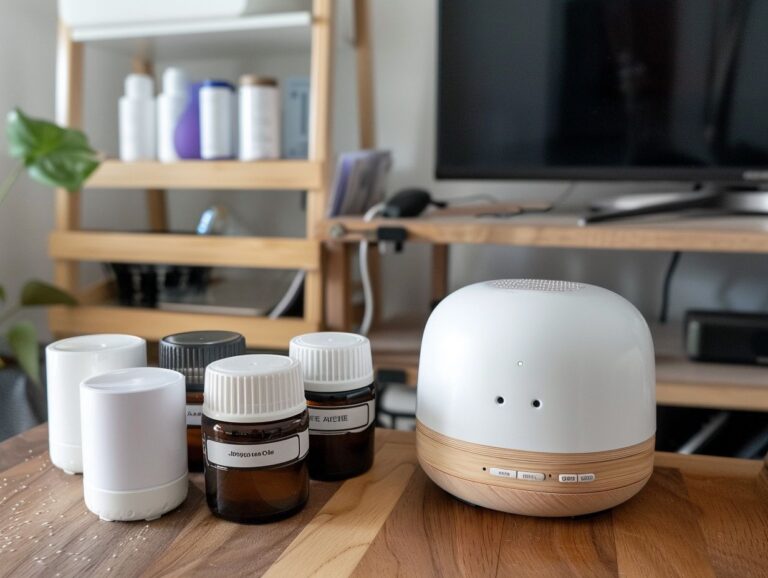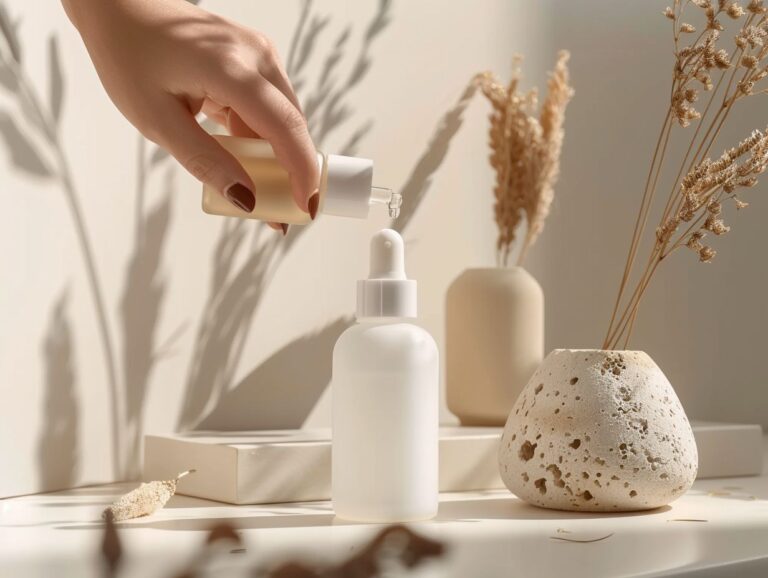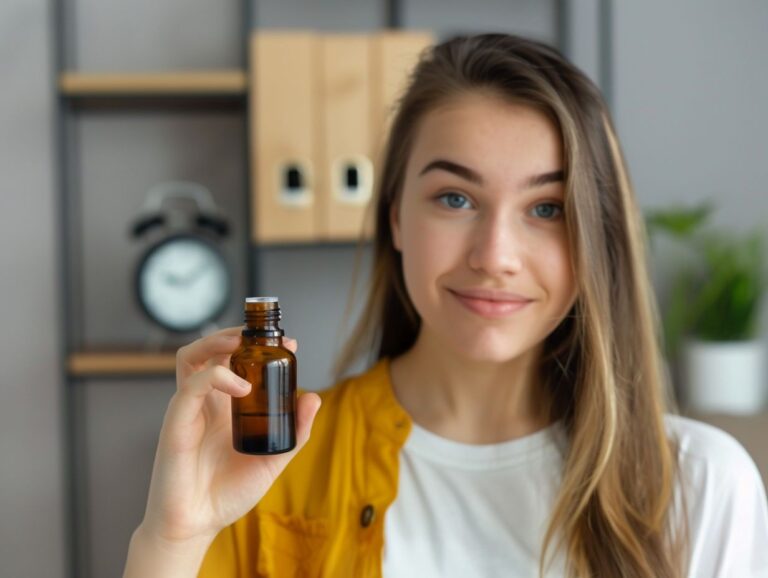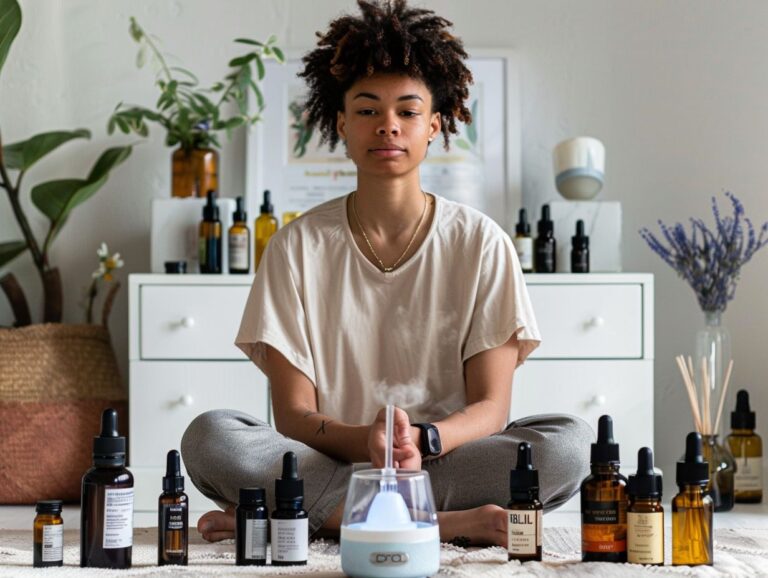Can You Put Essential Oils in a Drink
Essential oils have gained popularity for their various benefits, from aromatherapy to stress relief and pain management.
Can you add them to your drinks? We delve into the uses and benefits of essential oils, including how they can be ingested.
We also discuss the best essential oils to add to your beverages and the potential risks associated with ingesting them.
If you’re curious about incorporating essential oils into your drinks, read on to learn more.
Key Takeaways:
What Are Essential Oils?
Essential oils are natural compounds extracted from plants, known for their aromatic properties and potential health benefits when used correctly. These oils are highly concentrated and can be derived from various parts of plants, including the leaves, flowers, stems, and roots.
The extraction process of essential oils involves methods such as steam distillation, cold pressing, or solvent extraction, depending on the plant material used. Each method requires precision to ensure the purity of the oil. Quality control is crucial in producing effective and safe oils, as impurities or additives can diminish their therapeutic properties.
What Are the Benefits of Essential Oils?
Essential oils offer a wide range of benefits for both physical and emotional well-being. From supporting the digestive system to boosting the immune system, these oils have been used for centuries for their medicinal properties and overall health benefits.
In terms of the digestive system, essential oils like peppermint, ginger, and fennel can aid in digestion, reduce bloating, and soothe stomach discomfort.
In terms of immune support, oils such as tea tree, eucalyptus, and oregano have antimicrobial properties that can help fight off infections and strengthen the body’s defenses.
The aromatic compounds in essential oils can positively impact overall health by reducing stress, improving sleep quality, and enhancing mood, making them valuable additions to any wellness routine.
Aromatherapy
Aromatherapy involves using essential oils, such as citrus oils like lemon and grapefruit, either through inhalation or diffusion to promote relaxation, improve mood, and create a pleasant ambiance.
By utilizing the strength of nature’s aromatic essences, individuals can experience a range of benefits beyond just calming scents. Lemon oil, for example, is known for its invigorating properties, capable of boosting focus and mental clarity. On the other hand, grapefruit oil carries uplifting qualities that help combat feelings of stress and anxiety.
When blending these citrus oils with complementary scents like lavender or peppermint, the synergy created can offer a more holistic approach to well-being. Each essential oil brings its unique advantages, and when harmonized correctly, they work in tandem to amplify their overall therapeutic potential.
Stress Relief
Peppermint essential oil is renowned for its stress-relieving properties and invigorating scent. When used in aromatherapy or diluted for topical application, peppermint oil can help reduce feelings of stress and promote relaxation, making it a popular choice for calming the mind and body.
There are several ways that peppermint oil can be incorporated into your stress relief routine. One common method is to add a few drops to a diffuser, allowing the fresh aroma to fill the room and create a calming environment. You can also mix a few drops with a carrier oil and apply it to pulse points or the back of the neck for quick relaxation. Another effective way to use peppermint oil is by adding a few drops to a warm bath, allowing the steam to carry the scent and promote a sense of calmness.
Improved Sleep
Lavender essential oil is well-known for its calming and sedative properties, making it an excellent choice for promoting improved sleep quality. By diffusing lavender oil or applying it topically before bedtime, individuals may experience relaxation, reduced anxiety, and better overall sleep patterns.
One of the key benefits of using lavender essential oil is its ability to soothe the mind and body, helping to create a tranquil environment that is conducive to restful sleep. Research suggests that inhaling the scent of lavender can lower heart rate and blood pressure, signaling the body to enter a state of relaxation.
To incorporate lavender oil into your bedtime routine, try adding a few drops to a warm bath or using a diffuser to spread the aroma throughout your bedroom. You can also dilute the oil with a carrier oil and gently massage it onto your skin, focusing on pulse points like the wrists and temples.
Pain Relief
Ginger essential oil is a popular choice for natural pain relief due to its anti-inflammatory and analgesic properties. When used topically, ginger oil can help alleviate muscle soreness, joint pain, and headaches, providing a natural alternative for managing discomfort and promoting overall well-being.
Ginger oil’s anti-inflammatory properties make it particularly effective in reducing inflammation associated with conditions such as arthritis and migraines. The ability of ginger oil to stimulate circulation can also aid in improving blood flow in areas experiencing pain, facilitating quicker recovery. To harness these benefits, it is essential to dilute ginger oil with a carrier oil before applying it to the skin to prevent irritation. Always perform a patch test prior to widespread use to ensure no adverse reactions.
How Are Essential Oils Used?

Inhalation is a popular method where the oils are diffused into the air, allowing you to breathe in the therapeutic properties for respiratory and emotional support. This method is ideal for immediate relief and mood enhancement.
On the other hand, applying essential oils topically involves diluting them with a carrier oil and massaging onto the skin, facilitating direct absorption and localized benefits for targeted issues like skin conditions or muscle aches.
Ingestion, when done cautiously and under expert guidance, can have systemic effects by entering the bloodstream. This method can support digestion and overall well-being but requires careful consideration of proper dosage, quality of oils, and individual health conditions.
Inhalation
Inhalation is a common method for using essential oils to support respiratory health and promote emotional well-being. Citrus oils like lemon and wild orange are particularly popular for inhalation, as their uplifting scents can invigorate the senses and improve mood.
When inhaled, these citrus oils can help open up the airways, making breathing easier and clearer. Citrus oils are known for their cleansing and purifying properties, which can aid in reducing congestion and supporting overall respiratory function.
Along with their physical benefits, the refreshing aroma of lemon and wild orange can have a positive impact on one’s emotional state. The citrusy scent is often associated with feelings of happiness and energy, making it a fantastic choice for boosting mood and reducing stress levels.
Topical Application
Topical application involves applying essential oils directly to the skin, allowing for absorption and targeted benefits. When using essential oils topically, it is essential to dilute them with a carrier oil to prevent skin irritation and ensure safe application.
Applying essential oils topically can be a convenient and effective way to address various skin concerns and promote overall well-being. By diluting essential oils, you reduce the risk of sensitivities or adverse reactions, making them suitable for a wider range of individuals, including those with sensitive skin or children. To apply essential oils correctly, always perform a patch test on a small area of skin to check for any adverse reactions before widespread use. Consider using a blend of carrier oils to enhance the benefits of the essential oils and ensure proper skin penetration.
Ingestion
Ingesting essential oils involves consuming them orally, either by adding them to food or drinks. While some essential oils are safe for ingestion, it is crucial to select ingestible oils carefully, follow dosage guidelines, and prioritize safety to avoid potential adverse reactions.
When considering essential oils for internal use, it is important to choose oils that are labeled for consumption. Not all essential oils are suitable for ingestion and may pose risks if taken orally. Always consult a qualified aromatherapist or healthcare provider to determine the suitability of an essential oil for ingestion.
- Dosing is another critical aspect to pay attention to. Different oils have different potency levels, and incorrect dosages can lead to harmful effects. Be sure to follow recommended guidelines and start with low doses to observe how your body reacts.
- Remember that some oils can interact with medications or conditions, so it’s vital to disclose any health issues or medications you are taking before ingesting essential oils.
Always dilute essential oils properly before ingesting, as direct consumption can cause irritation or gastrointestinal problems. Prioritizing caution and education when using essential oils internally is key to safely benefit from their therapeutic properties.
Can You Put Essential Oils in a Drink?
Adding essential oils to drinks can enhance flavor and provide potential health benefits when done safely and correctly. While certain oils like lemon and grapefruit can be ingested, it is essential to dilute them properly and ensure they are safe for internal use.
When incorporating essential oils into beverages, always opt for high-quality, therapeutic-grade oils to avoid any chemicals or contaminants in your drink. Dilution ratios are crucial to prevent irritation or adverse reactions; a general rule of thumb is to use only a drop or two per serving. It’s wise to mix the oil with a carrier substance like honey or coconut oil before adding it to your drink to disperse the oil evenly and prevent any direct contact with sensitive tissues. Remember, not all essential oils are safe for consumption, so researching each oil’s safety profile is a must before ingestion.
Dilution is Key
When adding essential oils to drinks, dilution is key to ensure safety and prevent adverse reactions. Dilute oils with a carrier substance like water or a neutral-tasting beverage to disperse the oil effectively and minimize the risk of irritation or sensitization.
Proper dilution ratios play a crucial role in extracting the full benefits of essential oils without overwhelming the palate or causing harm. As a general guideline, a safe dilution ratio for ingestible oils is 1 drop of essential oil per 8 ounces of carrier substance. Common carrier substances include water, coconut milk, or honey, which aid in blending the oil seamlessly into your drink.
It’s imperative to source high-quality, food-grade essential oils from reputable suppliers to ensure purity and potency. Always start with a low dilution ratio and gradually increase as per your taste preferences, keeping in mind the potency of different oils.
Choosing the Right Essential Oils
Selecting the right essential oils for drinks is crucial to ensure they are safe for ingestion and complement the beverage’s flavor profile. Grapefruit essential oil, for example, can add a refreshing citrusy note to drinks when used in moderation and with proper dilution.
When choosing essential oils for beverages, it is essential to consider their source and quality. Opt for oils that are specifically labeled as safe for internal use, ensuring they are free from additives or impurities. Grapefruit oil and other ingestible oils should also be sourced from reputable suppliers to guarantee purity and potency.
Taste compatibility plays a significant role in enhancing the overall drinking experience. Essential oils such as lavender, peppermint, or lemon can infuse unique flavors into beverages, but it is crucial to experiment cautiously to find the right balance.
Safety Precautions

It is crucial to dilute essential oils properly before adding them to beverages. Concentrated essential oils are potent, and using them in their undiluted form can lead to irritation or digestive issues.
When incorporating essential oils into drinks, start with small quantities to gauge individual tolerance and reactions. Different people may react differently to certain oils, so it’s essential to observe any unexpected effects.
- Store essential oils out of reach of children and pets to avoid accidental ingestion.
- Be mindful of potential interactions with medications or existing health conditions when selecting oils for consumption.
What Are the Best Essential Oils to Add to Drinks?
Certain essential oils like lemon and peppermint are ideal choices for adding to drinks due to their refreshing flavors and potential digestive benefits. When used thoughtfully, these oils can enhance the taste of beverages while offering additional health support.
In terms of digestive advantages, lemon and peppermint oils are known for their ability to soothe the stomach and aid in digestion. Lemon oil, with its zesty and citrusy notes, can enliven any beverage, adding a burst of freshness. On the other hand, peppermint oil brings a cool, minty flavor that can be both invigorating and calming.
To reap the benefits of these oils, consider incorporating a few drops into water, tea, or smoothies. Be cautious with the dosage, as essential oils are potent concentrates and should be used sparingly in beverages. Mixing them with a carrier oil or sweetener can help distribute the flavors evenly.
Lemon Essential Oil
Lemon essential oil is a popular choice for adding a zesty kick to drinks while supporting digestive health. Its bright citrus flavor and potential benefits for the digestive system make it a versatile option for enhancing the taste and wellness properties of various beverages.
One of the key benefits of incorporating lemon essential oil into your drinks is its ability to aid in digestion. The oil is known for its calming effect on the stomach, helping to soothe digestive discomfort and promote healthy digestion. The citrusy aroma of lemon oil can uplift the spirits and create a refreshing drinking experience.
When using lemon oil in beverages, it is important to remember that a little goes a long way due to its concentrated nature. Start with just a drop or two and adjust according to your taste preferences. You can add it to water, teas, smoothies, or even cocktails to infuse a burst of flavor and potential health benefits.
Peppermint Essential Oil
Peppermint essential oil is prized for its refreshing flavor and potential digestive benefits, making it a popular choice for adding to drinks. Whether used in teas, smoothies, or infused water, peppermint oil can provide a cooling sensation and support digestive wellness.
One of the key advantages of incorporating peppermint essential oil in beverages is its ability to aid digestion. The menthol present in peppermint oil has been known to relax the muscles of the digestive tract, helping to reduce symptoms of indigestion and bloating. Not only does it add a refreshing minty taste to drinks, but it can also offer relief to those with digestive issues.
The versatile nature of peppermint oil allows it to complement a wide range of drink recipes. From adding a few drops to a morning smoothie to infusing it in a warm cup of herbal tea, the options are endless.
Lavender Essential Oil
Lavender essential oil is revered for its calming and soothing properties, making it an excellent choice for promoting relaxation and enhancing the sensory experience of drinks. By incorporating lavender oil into beverages, individuals can create a calming ritual that supports overall well-being.
Infusing can we drink essential oils into drinks not only adds a delightful floral aroma but also imparts a subtle flavor that complements various beverages.
Whether it’s infusing lavender-infused vodka for a refreshing cocktail or adding a drop of lavender oil to a cup of herbal tea, the possibilities are endless.
Mixing lavender oil with honey or sugar syrup can elevate the taste profile of beverages, offering a unique and soothing twist to familiar drinks.
Ginger Essential Oil
Ginger essential oil is renowned for its digestive benefits and spicy aroma, making it a versatile addition to a variety of beverages.
Infusing drinks with ginger oil not only adds a zesty kick but also aids in soothing stomach discomfort and promoting overall digestive wellness. The aromatic profile of ginger oil can vary depending on the extraction method and quality of the oil, with some boasting strong peppery notes and others offering a more subtle ginger undertone. Learn more about essential oils in water.
When incorporating ginger oil into your drinks, it’s essential to remember that a little goes a long way due to its potent nature. Start with a drop or two, stir well, and taste before adding more to adjust the intensity to your preference.
What Are the Risks of Ingesting Essential Oils?
While ingesting essential oils can offer benefits, there are potential risks to be aware of, including allergic reactions, interactions with medications, and the risk of toxicity if not used properly. Understanding these risks is essential for safe internal use.
Identifying allergic reactions is crucial; symptoms can vary from skin irritation to respiratory issues. Recognizing these signs early on can prevent further complications. Caution is vital when using essential oils alongside medications, as they can affect drug metabolism and efficacy. It’s advisable to consult a healthcare professional before internal use to avoid adverse interactions. To prevent toxicity, always dilute oils properly and adhere to recommended dosages. Educating oneself on these aspects is fundamental for a safe and beneficial experience.
Allergic Reactions

When conducting a patch test, apply a small amount of diluted oil to a small area of skin and wait for 24 hours to observe any reactions. Symptoms of allergic reactions vary from mild itching or redness to more severe swelling or difficulty breathing, depending on the individual’s sensitivity.
Seeking medical advice before internal use is particularly important as some oils can have adverse effects when ingested, leading to gastrointestinal distress or exacerbating underlying conditions.
Being aware of these potential risks and being cautious in your approach can help you enjoy the benefits of essential oils without compromising your well-being.
Interactions with Medications
Essential oils may interact with certain medications, affecting their absorption or metabolism in the body. It is essential to consult with a healthcare provider or pharmacist before ingesting oils if you are taking medications to avoid potential interactions or adverse effects.
Some common interactions between essential oils and medications include grapefruit oil with statins, which can lead to an increase in medication side effects. Oils like peppermint and eucalyptus can interfere with certain blood pressure medications or anticoagulants, potentially causing undesirable effects. Seeking professional advice can help you navigate these potential risks safely. Learn more about essential oils in water.
When considering internal use, remember that dilution and moderation are key. Always follow recommended dosages, opt for high-quality oils, and be mindful of underlying health conditions that may influence how your body responds to the mixture.
Potential Toxicity
Essential oils have the potential to be toxic if ingested in large quantities or used improperly. Symptoms of toxicity may include nausea, vomiting, or central nervous system effects, underscoring the importance of following dosage recommendations and practicing safe use.
It is crucial to note that the concentration and purity levels of essential oils can greatly impact their potential toxicity. For instance, certain oils like wintergreen or tea tree oil are known to be especially potent and should be used with extreme caution. Drink Essential Oils Always dilute essential oils properly before applying them topically or using them aromatically.
Preventive measures can also be taken by keeping essential oils out of reach of children, properly labeling containers, and seeking guidance from a qualified aromatherapist or healthcare professional for appropriate use.
Frequently Asked Questions
Can You Put Essential Oils in a Drink?
Yes, you can put essential oils in a drink. However, it is important to use caution and follow proper guidelines.
What types of essential oils can be used in drinks?
Only food-grade and therapeutic-grade essential oils should be used in drinks. These types of oils are safe for consumption and have been tested for purity.
How do you properly dilute essential oils for drinks?
Essential oils are highly concentrated and should always be diluted before adding them to drinks. The recommended dilution ratio is 1-2 drops of essential oil per 8 ounces of liquid.
What are the benefits of putting essential oils in drinks?
Essential oils can add flavor and health benefits to drinks. They can also provide a natural alternative to artificial flavorings and sweeteners.
Are there any safety precautions to consider when putting essential oils in drinks?
Yes, essential oils are potent and can cause adverse reactions if not used properly. It is important to research the specific oil and its recommended uses before adding it to a drink.
Can essential oils be used in all types of drinks?
No, some drinks may not be suitable for essential oils. For example, carbonated drinks may cause the oils to disperse too quickly, and hot drinks may alter the chemical makeup of the oils. It is best to stick to still, cold drinks when using essential oils.








One Comment